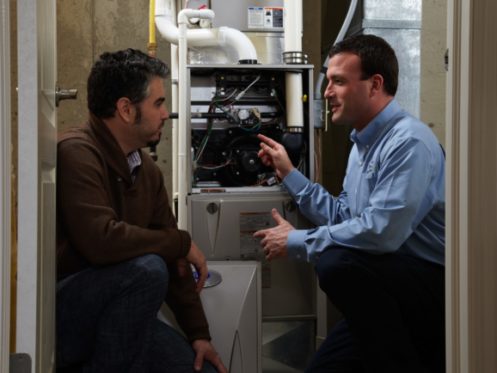Several Reasons Why Your Furnace Oil May Need to Be Replaced
Often valued for its safety and efficiency, furnace oil is not without its challenges. If you use heating oil in your Rome, Georgia home, practicing good tank maintenance and scheduling regular refills is an absolute must. Whether you’ve got an older tank or have just purchased existing construction, your HVAC technician may advise you to have your furnace oil changed. The following covers several reasons why.
Problems With Short-Term Furnace Oil Alternatives
One reason why many homeowners like having furnace oil is the fact that it’s chemically similar to diesel fuel. These two distillates are closely related and work much the same. However, they aren’t truly identical. If you run out of furnace oil in the middle of winter and cannot find a heating oil company to make an urgent delivery, you can always head over to your local gas station and purchase a few gallons of diesel to hold you over.
Most consumers understand that the two major differences between diesel and heating oil are the rate at which these fuels are taxed and the distinctive red coloration that diesel bears. However, there’s another difference that’s worthy of note. It’s that diesel actually burns quite a bit hotter than home heating oil. The extra heat that it creates during combustion isn’t a big deal if diesel is used as a heating oil alternative for a very short period of time.
If you use diesel as a heating oil alternative for a week or more, the extra heat generated during combustion will start to take a toll on your furnace. After short-term diesel use, heating oil delivery companies often refill tanks without draining out the remaining diesel. However, if a furnace is already showing signs of serious distress, draining the remaining diesel out and filling the tank with pure heating oil could be the best decision.
Your Heating Oil Tank Is Riddled With Corrosion
One of the most common reasons why HVAC technicians replace furnace oil is the widespread development of corrosion. Rusty, corroded tanks are more likely to leak than tanks that are absolutely rust-free. They also have a very high likelihood of damaging home heating systems as rust and other contaminants travel up fuel supply lines.
Taking the existing oil out will ensure that rust-related contaminants aren’t traveling into the actual heating system. It also gives technicians the chance to remove and replace damaged tanks before they cause ground contamination or other environmental problems.
There’s Water in Your Furnace Oil
Tank corrosion is a sign of poor tank maintenance and high levels of water. When water gets into your furnace oil, its ability to combust declines. Having water in your heating oil tank is bad for both the tank itself and your furnace.
Water often enters these units via damaged tank vents, filler caps that are ill-fitting, cracks, and corroded seals. If water is an issue, the point of ingress must be identified and resolved. In most instances, this means replacing the heating oil tank entirely. After all, if water can get in, fuel oil can seep out.
If a leaky filler cap is determined to be the point of entry, it may be possible to have your tank repaired rather than replaced. However, all of the stored oil that’s already been contaminated with water will need to be drained, and the fuel tank must be refilled. If you’ve been using heating oil with high water content for some time, it might additionally be necessary to have the tank lines bled.
You’ve Let Fuel Oil Levels Drop Too Low
Failing to schedule timely heating oil deliveries can be far more than frustrating. It can also prove incredibly expensive. Most HVAC companies advise against letting tank levels drop below the one-quarter fill mark. In fact, you should ideally schedule fuel oil delivery service when your tank is just one-third of the way full. Letting oil levels drop much further could cause sludge and other sediment to start traveling up the fuel line.
When people continue using their oil-fired furnaces even though their heating oil tanks are nearly empty, contaminants travel up the fuel supply line and enter the heating system. Low fuel levels also make heating oil tanks more likely to develop corrosion and other wear-related issues. If you’ve let your fuel oil levels drop too low, your fuel lines will probably have to be bled to clear them before the new furnace oil is added. In most cases, all remaining, sludge-ridden oil will have to be drained and discarded.
You’ve Purchased Low-Quality, Recycled Heating Oil
Not all furnace oil is equal in quality and viability. If you decide to get rid of your oil-fired furnace and have lots of oil remaining in your tank, this will have to be drained by a licensed fuel delivery company. If the company that drains your tank believes that your heating oil is still usable, they may recycle and resell it. Many heating oil delivery services aren’t always offering fresh, virgin heating oil. Instead, they’re carrying around tanks of heating oil that’s been collected from multiple sources.
At times, this can be a very cost-effective yet high-risk way to get the oil you need to keep your home warm. Recycled heating oil is typically offered at incredibly low prices. Although these discounts can definitely come in handy when you’re having cash flow issues, the impurities that recycled oil contains will cost you far more further down the road. Recycled oil can contain water, rust particulates, and sludge from each of the tanks it was sourced from. All of these things will pass into your tank as soon as this oil is delivered. Replacing recycled furnace oil is usually necessary when heating oil tanks are excessively dirty and must be professionally cleaned and maintained.
Your Furnace Oil Has Expired
Also known as No. 2 Heating Oil, furnace oil is derived from crude oil and has a finite lifespan. Fortunately, its lifespan is long enough to last from one heating season to another. Thus, if you don’t use up the last of the furnace oil in your tank before winter ends, it should still be good when winter rolls around again. When properly stored, heating oil typically lasts between 18 and 24 months.
This lifespan becomes problematic when homeowners have secondary sources of heating and rarely turn their oil-fired furnaces on from year to year. You might have a vacation home that you rarely visit, and the heating oil in this home’s tank could be far too old to remain safe and effective. Sometimes properties that are put up for sale sit on the market for so long that their heating oil actually expires before qualified, motivated buyers take them over. If the heating oil in your tank has sat for more than 18 months, HVAC technicians strongly advise that you replace it.
Since 1987, Hitchcock Heating & Air has been a trusted provider of heating and cooling services throughout the region. Residents of Rome, Georgia can also turn to us for indoor air quality services, smart home technologies, and preventative maintenance plans. If your oil-fired furnace needs maintenance or repairs, or if you’re ready to transition away from an oil-fired heating system, we’ve got you covered. Give us a call today!


